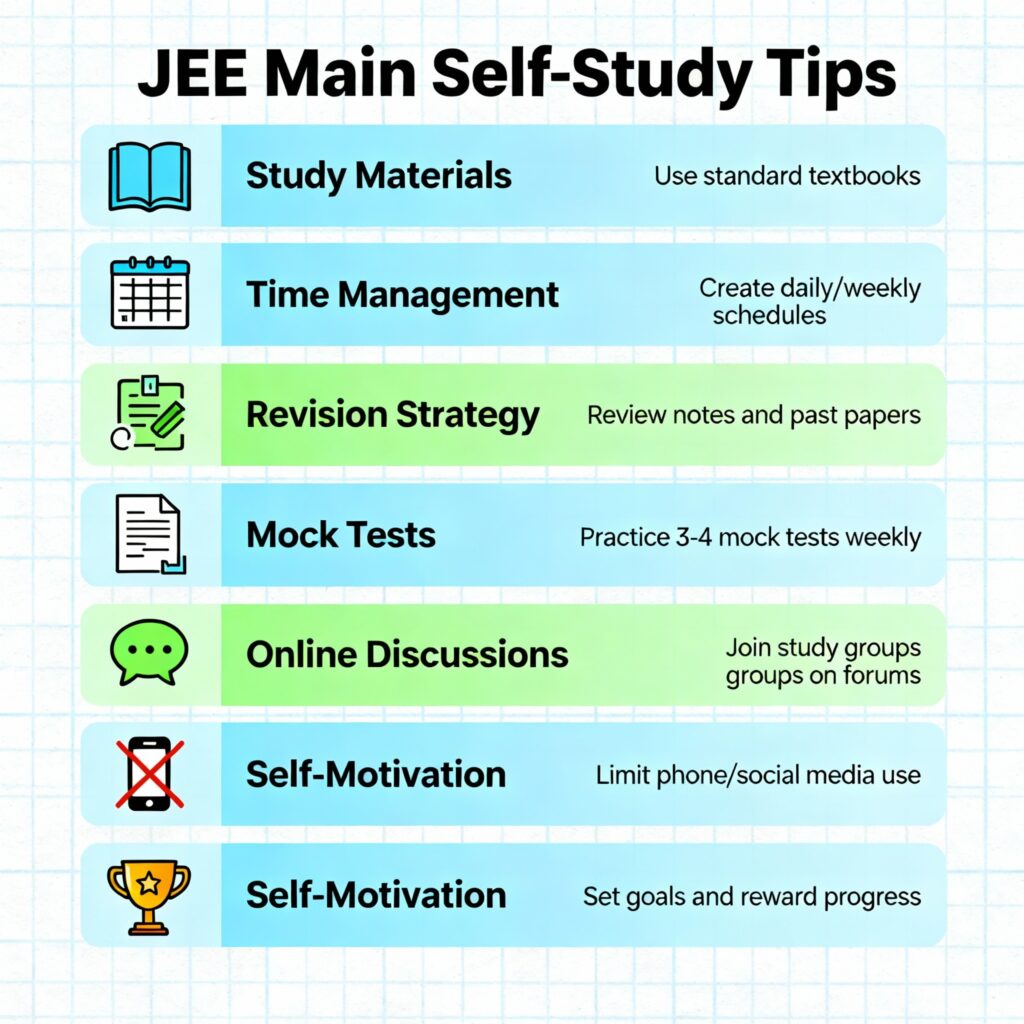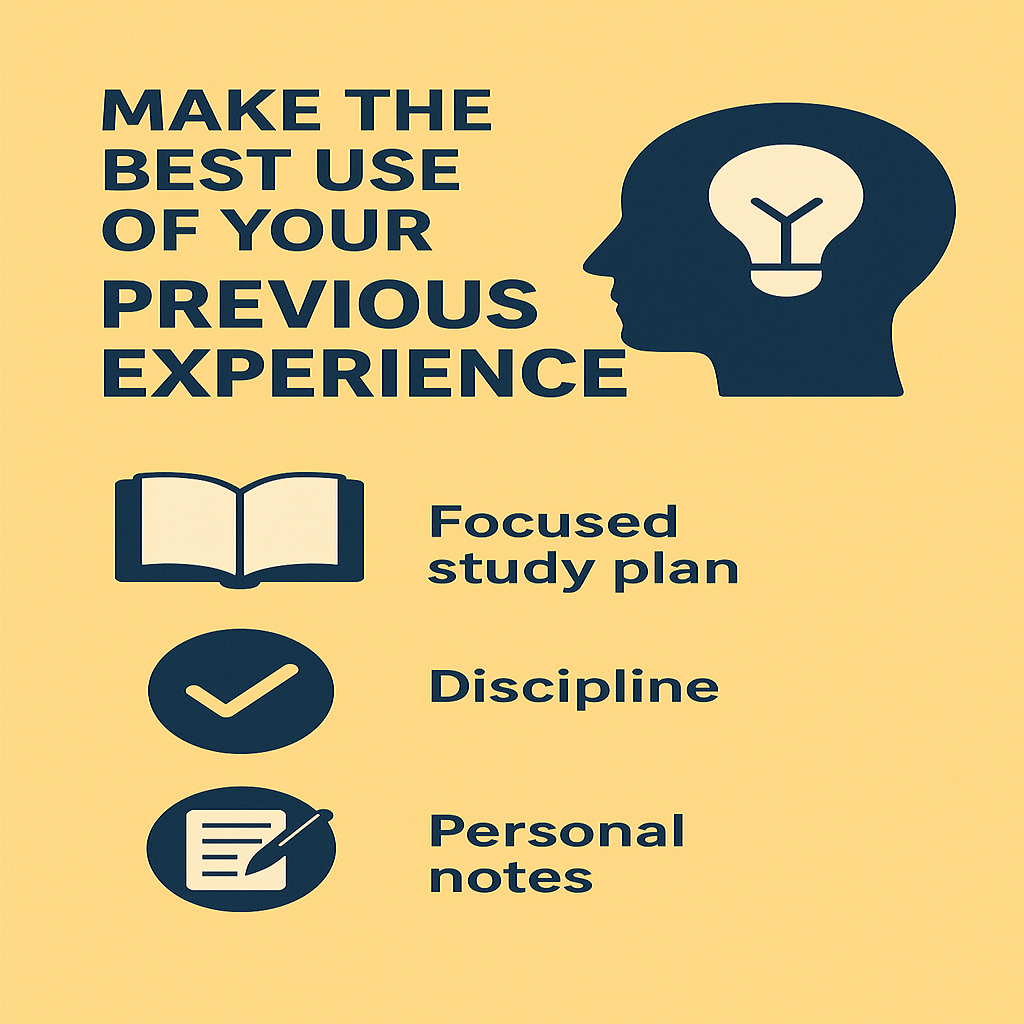Students who appear for the JEE Main exam have to attempt multiple-choice questions from subjects like Physics, Chemistry, and Mathematics. Thus, many students often wonder, “How to prepare for JEE Main?” Preparing for this exam requires a deep understanding of concepts across these subjects, not just memorizing formulas or facts.
With lakhs of students competing every year, thorough and smart preparation is essential to stand out and secure top ranks. This involves regular practice, solving previous year question papers, clarifying doubts, and revising important topics frequently.
Ultimately, disciplined and consistent effort is the key to cracking JEE Main and moving closer to one’s dream of engineering admission.
This blog helps you by providing useful tips and detailed information about the JEE Main preparation. With this guidance, candidates can focus better on their studies and approach the exam with confidence.
Follow this simple step-wise guide to organize your JEE Main preparation for better focus, steady progress, and exam success:
The first and foremost step to prepare for JEE Mains is to understand its exam pattern. JEE Main is further categorized into two papers: Paper 1 (B.E/B.Tech), Paper 2A (B.Arch) or Paper 2B (B.Planning).
Paper 1 (B.E/B.Tech) consists of 75 MCQs and NVQs of Physics, Chemistry and Mathematics for a total of 300 marks. This exam is conducted in online mode making it accessible for the students.
Paper 2A (B.Arch) consists of 77 questions categorized in MCQs and NVQs for a total of 400 marks. The three subjects in this exam are Mathematics, Aptitude and Drawing. The exam is conducted either in an online and offline method.
Paper 2B (B.Planning) consists of 100 questions of Mathematics, Aptitude and Planning based questions for 400 marks. It consists of MCQs and NVR based questions. Students can give this exam online.
Every year NTA releases the updated JEE Main syllabus for the students who are appearing for the exam. It is very important for the candidates to know the JEE Main syllabus along with important topics for each subject. Refer to the table below to know JEE Main subject wise important topics:
| Subject | Topics |
|---|---|
| Mathematics |
|
| Physics |
|
| Chemistry |
|
Effective JEE Main preparation requires the correct study material to be selected. Start with NCERT text books in Physics, Chemistry and Mathematics as they provide the fundamentals and are also suggested by the experts. Once you complete NCERT, look up reference texts, such as Physics (H. C. Verma), Chemistry (O. P. Tandon), and Mathematics (R. D. Sharma) to further your knowledge and look at other harder questions.
It is very important for the candidate to solve the previous year question papers. Here are some reliable online resources, and free study notes are always useful to find all the kinds of questions that are likely to be asked in a test.
Having a timetable is an effective way of controlling the study time.
A daily, organized practice schedule will help make big targets seem less formidable and keep you on schedule.
Revising regularly can help keep the ideas in your mind and to remember them better when it is time to take the exam.
It is better to clear doubts at the beginning to avoid confusion and gain confidence and pay more attention to the following topics.
With an exam plan, excess stress is eliminated and confidence builds. Plan in advance which topic you will do first, how much time you will allocate to each part, and which questions to do first.
Ensure that you are familiar with the test center regulations, that you have all the necessary documents, and that you have a good sleep before you take the test.
Test yourself with timed practice mock tests to develop your plan and make the real exam day easier and more successful.
One important step in your JEE Main preparation is to practice with previous year question papers. These papers help you understand the exam pattern, types of questions, and difficulty level. Solving them improves time management and boosts confidence.
Analyzing answers gives insight into important topics and common question trends. Make it a habit to regularly solve past papers to strengthen your preparation and identify areas that need more focus for better results.
This is a sample daily timetable for students who want to balance their JEE Main preparation effectively:
| Time | Activity |
|---|---|
| 6:00 AM- 7:00 AM | Wake up and freshen up |
| 7:00 AM- 8:00 AM | Study Physics |
| 8:00 AM- 9:00 AM | Breakfast and a short break |
| 9:00 AM- 10:30 AM | Study Mathematics |
| 10:30 AM- 11:00 AM | Break |
| 11:00 AM- 12:30 PM | Study Chemistry |
| 12:30 PM- 1:30 PM | Lunch and Rest |
| 1:30 PM- 3:00 PM | Revision |
| 3:00 PM- 3:30 PM | Break |
| 3:30 PM- 5:00 PM | Previous Year Papers |
| 5:00 PM- 5:30 PM | Short Break |
| 5:30 PM- 7:00 PM | Learn Formules |
| 7:00 PM- 8:00 PM | Dinner and relax |
| 8:00 PM- 10:00 PM | Revision |
| 10:00 PM | Wind down and Sleep |
Note: Students can always make changes to this timetable according to their likings.

It is entirely possible to prepare JEE Main without coaching unless you start with the right mindset and strategy. The trick is to be structured and to be disciplined. Here are some tips to prepare:
Self study needs attention and practice, though with hard work you can pass JEE Main without coaching.
.png&w=1920&q=75)

You are a dropper or repeater, then make the best use of your own previous experience.
Students who are willing to pursue undergraduate, post graduate in engineering from the top institutes in the country have to clear JEE Main and JEE Advanced. Any student who has appeared for 12th or equivalent exam, can qualify for JEE Main 2026. There is no age limit set for the students, however, every student can only take 3 attempts after their 12th standard.
This exam is specifically designed for students who are interested in applying for engineering, technology and architecture. Students who pursue their higher education through diploma can also apply for the test making it accessible for all the students.
Top Engineering Colleges in India 2025







Articles recommended for you

CUET PG

college

college

college

college

college

college

college

college

college
Chat with us